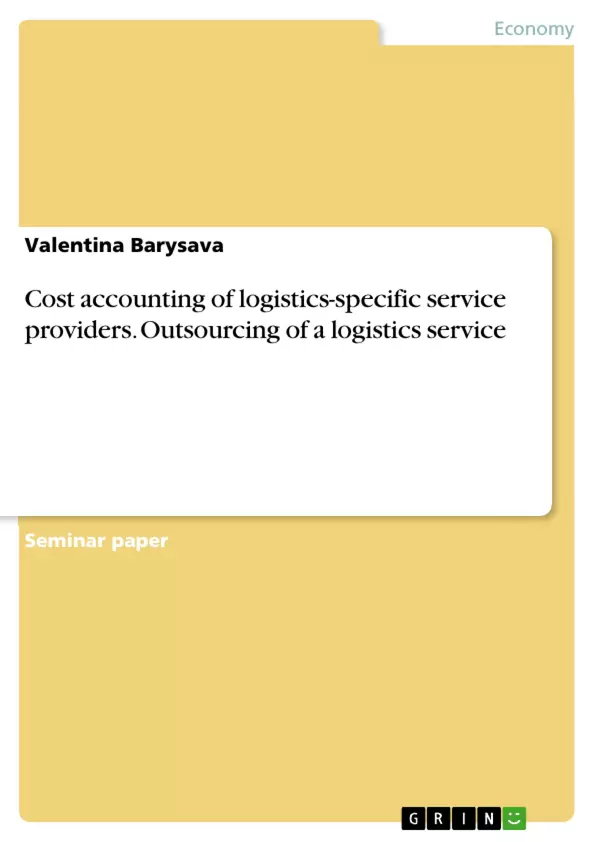When making the decision to outsource a logistics service, one must be prepared to face several issues. For some companies outsourcing is the better alternative, for others it is not.
In this paper, we will take a closer look at the topic of outsourcing a logistics service and present the possible solution that can be made based on activity-based costing and the study of principal-agent theory.
Table of Contents
- Introduction
- Problem
- Aim of the work
- Delimitation of the subject
- Theories from logistics
- Process cost accounting
- Theories of service management
- The Principal-Agent Theory
- Conclusion
- References
Objectives and Key Themes
This thesis examines the cost-based decision on logistics outsourcing and aims to provide an overview of possible risks and corresponding solution approaches. It explores the challenges of cost transparency and the potential for opportunism in outsourcing partnerships.
- Cost-based decision-making for logistics outsourcing
- Cost transparency and activity-based costing
- The principal-agent theory and its implications for outsourcing
- Risk assessment and mitigation strategies in outsourcing
- Case study analysis of a medium-sized company considering logistics outsourcing
Chapter Summaries
The introduction presents the problem of outsourcing logistics services, highlighting the challenges of cost transparency and the potential for opportunistic behaviour in customer-provider relationships. The paper takes the example of a medium-sized company considering outsourcing its storage and shipping operations. The aim of the work is to provide a comprehensive overview of cost-based decision-making for logistics outsourcing, including potential risks and solutions.
Chapter 2 delves into the theory of process cost accounting, particularly focusing on Activity-Based Costing (ABC). ABC is considered the most suitable cost accounting system for logistics due to its ability to provide cost transparency and enable a more cause-oriented cost distribution. This chapter examines the challenges of determining in-house production costs and the importance of accurately recording process sequences and activities.
Chapter 3 explores the Principal-Agent Theory, which is relevant to the customer-provider relationship in logistics outsourcing. This theory acknowledges the potential for conflicting goals between the two parties and the risks of opportunistic behaviour. It highlights the need for careful consideration of these risks when evaluating outsourcing options.
Keywords
Logistics outsourcing, cost accounting, activity-based costing, principal-agent theory, cost transparency, opportunism, customer-provider relationship, risk assessment, outsourcing decision, case study.
Frequently Asked Questions: Logistics Outsourcing
What are the main risks of outsourcing a logistics service?
Key risks include a lack of cost transparency and the potential for opportunistic behavior by the service provider.
Why is Activity-Based Costing (ABC) recommended for logistics?
ABC provides better cost transparency by distributing costs based on specific activities and processes rather than general overhead.
What is the Principal-Agent Theory in the context of outsourcing?
It describes the relationship between a customer (principal) and a provider (agent), focusing on conflicting goals and information asymmetry.
How can a company determine if outsourcing is the better alternative?
By accurately recording in-house production costs and comparing them with provider quotes using process-oriented cost accounting.
What does "opportunism" mean in outsourcing partnerships?
It refers to one party taking advantage of the other's dependency or lack of information to maximize their own benefit at the partner's expense.
- Quote paper
- Valentina Barysava (Author), 2015, Cost accounting of logistics-specific service providers. Outsourcing of a logistics service, Munich, GRIN Verlag, https://www.grin.com/document/1167499



